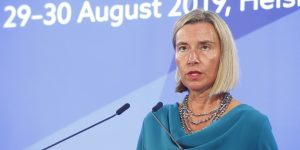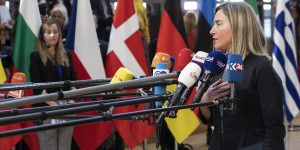Check against delivery!
Thank you very much.
We had a very dense agenda, so I will try to go through the different issues we touched upon. But I would like to start by thanking the Austrian Presidency and Karin [Kneissl, Foreign Minister of Austria] personally for a wonderful welcome and hospitality and also very good cooperation and political preparation of this informal meeting of the Foreign Ministers.
We started yesterday with a discussion on the Middle East – the wider region of the Middle East – trying to bring coherence to our approach on the different files of the region.
First of all, on the Israeli-Palestinian conflict: we exchanged views on the current lack of process, reiterating our firm position on the need for a two-state solution as the only realistic one. And we focused, in particular, on our support for the work that the UN and Egypt are doing on Gaza. We will pursue this work further, especially in view of the UN General Assembly week in New York in a few weeks’ time and our support to UNRWA [United Nations Relief and Works Agency for Palestine Refugees], which we are funding very consistently and which we are going to continue to support, not only for the Palestinian refugees in Gaza, but also for the need to support Jordan and Lebanon in this respect.
We also touched upon the situation in Syria that was actually central to our debates yesterday on the Middle East. First and foremost with a strong message on Idlib: we see the need to prevent and avoid a military action in Idlib that would be a humanitarian catastrophe, we believe. We also discussed ways in which we can increase even more our humanitarian assistance for Syrians, including inside Syria, while still keeping a very clear position on the fact that European Union money for reconstruction in Syria will only come once the political process will be firmly underway under UN auspices. We will have a ministerial meeting on Syria in New York in the margins of the UN General Assembly. And we will work also together with the Austrian Presidency to prepare it well.
Regional dynamics are critical to peace in Syria and we discussed in this context also Iran’s regional behaviour, which is of very serious concern to all of us and that we need to address. We discussed this quite in detail.
At the same time our work continues to preserve the nuclear deal. You might have seen just yesterday the IAEA [International Atomic Energy Agency], based in Vienna – and the deal was signed in Vienna too – released its 12th report certifying that Iran is still complying with all its nuclear related commitments. This is good news. Our work continues with all the Member States and with other partners in the world, to make sure that Iranians and Iranian citizens can benefit from the economic relations not only the European Union’s Member States, but also others in the world.
The second point on the agenda yesterday was related to the Transatlantic relations, which is a key pillar of the European Union foreign policy. The United States are the closest partners and friends we have always had and that does not change; that continues. There are some issues on which we have clear divergences and we are very clear and frank on this. But there are also many other on which our cooperation continues to be excellent and key for the success of our common work. I could just mention DPRK [Democratic People’s Republic of Korea] as one example, but there are many others.
We had this morning a good discussion with the Ministers on the Western Balkans. Here, again, I would like to highlight the role of the Austrian Presidency. After the Bulgarian Presidency and before the Romanian Presidency, this gives us a very good framework for defining the work we do with the Western Balkans and in the Western Balkans as a top priority for the European Union.
We touched upon, in particular, the support to the dialogue between Belgrade and Pristina that I facilitate. I will host a new meeting of Mr [Hashim] Thaçi [President of Kosovo] and Mr [Aleksandar] Vučić [President of Serbia] next week – exactly one week from now – to continue the work that we facilitate to reach a legally binding agreement.
We also discussed the upcoming elections in Bosnia and Herzegovina, hoping that they will bring a result that can be easily and smoothly implemented, so that there is no vacuum and we can continue to work with the authorities of the country on the reform agenda.
And, obviously, we also touched upon the upcoming referendum in Former Yugoslav Republic of Macedonia, which has our full support as we have expressed our full support to the agreement that was reached by Skopje and Athens on 17 June on the name issue, a historic agreement that has all of our support.
We also discussed two issues that were not on the agenda, still with the 28 Foreign Minister. One is the situation in Venezuela, where we decided to step up our diplomatic engagement together with the countries in the region to try and encourage the relaunching of a dialogue. We are extremely worried for the humanitarian situation in the country, but also the effect on the neighbouring countries that are receiving massive waves of Venezuelans in their territory. The European Union adopted a package of humanitarian aid of €35 million to support Venezuelans both inside Venezuela, but also in the neighbouring countries and the host communities in the neighbouring countries, focusing, in particular, on nutrition, water, health and the support to the most vulnerable people.
We also discussed Operation Sophia, as we did yesterday with the Defence Ministers. I have seen a strong commitment by all Member States, both yesterday and today. A unanimous commitment to, first of all, continue the Operation that has brought good results and that is in the interest of all to be kept and, second, I have seen a strong commitment to work together and to find practical, operational solutions to the issue of the sharing of responsibility of the management of those who disembark from search and rescue operations. This process will now proceed in the coming days. As I said yesterday, this is going to be a difficult process, but I am positive and optimistic on the fact that we could reach positive results in the coming weeks, in parallel and in coordination with the work that has been done in other fora as a follow-up to the European Council meeting in June and in preparation of the next Heads of State and Government meeting in Salzburg, because there are aspects that relate to internal decisions that are in the hands of Heads of State and Government. We will coordinate closely now in the coming days and weeks to try to find and build consensus on solutions that can allow our Operation Sophia to continue to operate with full predictability and a smooth and practical way to move forward. I also suggested to the Foreign Ministers that the external aspects of migration will be on the agenda of the next Foreign Affairs Council in October.
Last but not least, we had an excellent session with the candidate countries’ Foreign Ministers, just now, on effective multilateralism. This is a very welcome top priority for the Austrian Presidency; this is the very DNA of the European Union. The European Union being the most successful experiment of multilateralism in human history, it is only natural for us to invest in multilateralism both in terms of approach and in terms of institutions in all the different fields, from trade to the UN system. And this is an issue and an approach that we definitely share with all the candidate countries and we have discussed today ways to work together in this respect. So, thank you again and thank you, Karin, for an excellent work we have done together in these days.



